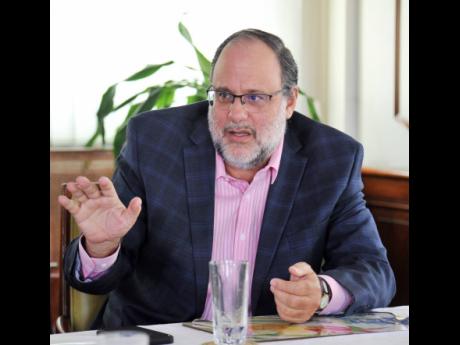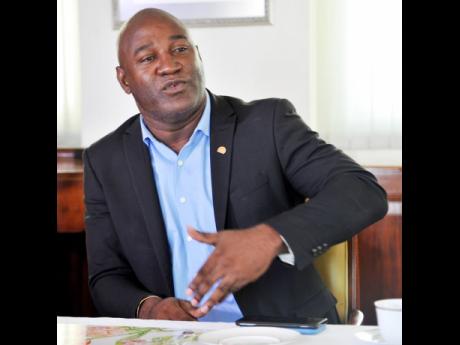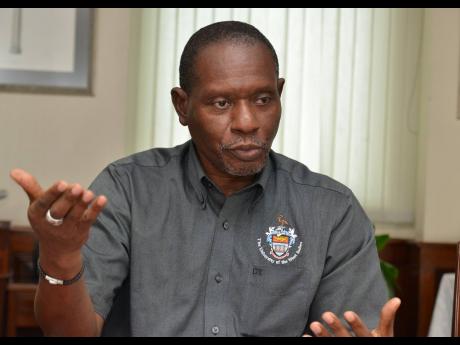Golding: Not interested in being popular
Opposition leader wants to be judged for competence, honesty and legislative track record
Almost three years after an unexpected rise to the pinnacle of the People’s National Party (PNP), Mark Golding is pinning his electability on the electorate’s perception of his competence, honesty and legislative track record. Golding, whose...
Almost three years after an unexpected rise to the pinnacle of the People’s National Party (PNP), Mark Golding is pinning his electability on the electorate’s perception of his competence, honesty and legislative track record.
Golding, whose positive favourability rating has not topped 15 per cent in the last two publicly released Don Anderson polls, has admitted that he has no issues being perceived as an average leader if the country’s main opposition party remains ahead in the polls and, ultimately, forms the next government.
“The kind of person I am, I’m not given to making statements that are not true. I try to avoid doing that. I try to avoid making commitments that I’m not confident can be delivered on,” Golding told senior journalists during a Gleaner Editors’ Forum last Thursday.
The forum comes as the party prepares to celebrate its 85th anniversary that should culminate with its annual conference on September 17.
“I’m not seeking to embellish my popularity through hype. I think there is a role, of course, for excitement in politics and I understand that. But generally speaking, I want to be somebody who the public sees as competent, as honest and who has delivered in government before,” Golding, 58, said.
The former justice minister in the Portia Simpson Miller-led Administration said at that time, he carried the “very onerous” legislative programme, which included the International Monetary Fund (IMF) programme, saddled with structural benchmarks that were delivered on time.
This, he said, reformed the economy, bearing fruits of an open fiscal space and debt reduction.
“So, I want to be somebody who they may say, ‘Yeah, him nah wear nuh green Clarks but he, at least, is somebody who we can rely on who has a track record of success in business, who has a track record of success in the practice of law, who has come to politics relatively late in life … and who is here to really try and move the country forward in the direction that will benefit everybody’,” said Golding.
OPPOSITION PARTIES ATTRACTIVE BECAUSE OF LEADER’S CHARISMA
Political scientist Dr Christopher Charles has given Golding a B grade in terms of meeting the basic Westminster requirement for an opposition leader.
According to Charles, a professor in political and social psychology at The University of the West Indies, Mona, Golding has “fared well” in nominating senators, appointing his shadow cabinet, engaging with the media and leading the Opposition’s criticism of the Government inside and outside of Parliament, as well as meeting with interest groups.
“He has certain attributes that the political gatekeepers inside and outside the PNP like. He is a white Jamaican, he is rich – less likely to engage in corrupt enrichment– he entered politics from the private sector, and he was educated as a lawyer at the prestigious University of Oxford,” Charles noted.
He said at the party level, Golding has weathered and survived most of the colourised and class-based attacks, and the lingering acrimony for supporting Dr Peter Phillips over Simpson Miller for leadership of the PNP.
Added to that, Charles said Golding and the PNP, respectively, have caught up with Prime Minister Andrew Holness and the Jamaica Labour Party (JLP) in the polls.
But has the opposition leader lifted the profile of the party, which has outpaced his popularity?
Charles said that traditionally, the profile of the country’s major political parties is entrenched in the political culture, given their crucial role in the development of the labour and nationalist movements for political independence.
He argued that opposition parties in the Westminster system become attractive because of the charisma of the leader, which is the opposition leader having a compelling personality; perceived party unity after protracted infighting; whether the leader articulates grand, attractive and transformative ideas that people from various sectors of society converge around; and whether the prime minister and Government are unpopular.
He concluded that the PNP and Golding are more attractive because of arguments two and four – perceived unity and the decreasing popularity of the governing JLP.
“In the Jamaican variant of Westminster, the opposition is the structural alternative to the government because we have a two-party dominant system where Jamaica is a graveyard for third parties. We have a ‘Tweedledee Tweedledum’ system where there is political musical chairs between two parties that are functionally the same,” Charles explained to The Sunday Gleaner.
On the matter of Golding’s appearance, the professor said the white phenotypical features of former prime ministers Sir Alexander Bustamante, Michael Manley and Edward Seaga were radically different from that of black Jamaicans “and they won elections”.
He said the black race card that the PNP used effectively in support of P.J. Patterson against Seaga in the early 1990s would be deemed “racist now with widespread social outcry if the JLP tried it against Golding”.
POTENTIAL TO BE ‘AN EXCELLENT PRIME MINISTER’
General secretary of the PNP, Dr Dayton Campbell, is discrediting the argument that Jamaica is a leader-centric nation.
“I’ve heard it a lot, but I’m not familiar with the evidence,” Campbell told the forum.
Campbell said from his assessment, 60 to 70 per cent of electorates who vote do so based on political parties.
He said 20 per cent vote for the party’s leader and 10 per cent cast ballots for its candidates.
“If you look at our past leaders, the most successful of them all has not been the most popular of them all. That is the evidence that is there. What is required for victory is for you to be able to understand the factors that are at play,” he said.
Campbell said that the PNP lost 160,000 votes between the 2011 and 2020 general elections.
He said that the party’s first priority is to re-engage those people and to bring them back on board as the country prepares for the next general election, constitutionally due in 2025.
“You then want to have a platform on which you can communicate now to those who are on the fence, to those well-thinking persons who want to understand exactly what separates the Mark Golding and a future Mark Golding administration from what currently exists,” the general secretary explained.
“When you take those factors together, I think the reading of just ‘good’ and ‘very good’ to say that those [figures] are the only ones that support the person and think the person should lead is also erroneous … ,” he said referring to the interpretation of poll findings. “We’ve now changed the rules in the middle of the game. Good, very good and average are persons who are normally supportive of you.”
He insisted that the opposition ought to be graded on how they hold the government to account, how cohesive they are and the proposals for policy they have been put forward.
“It is an egotistical person that wants to be all the way [at the top]. Our focus is where the PNP is. We know that Mark Golding is a competent leader and will be an excellent prime minister. Therefore, our mission is to get the party to win,” said Campbell.



